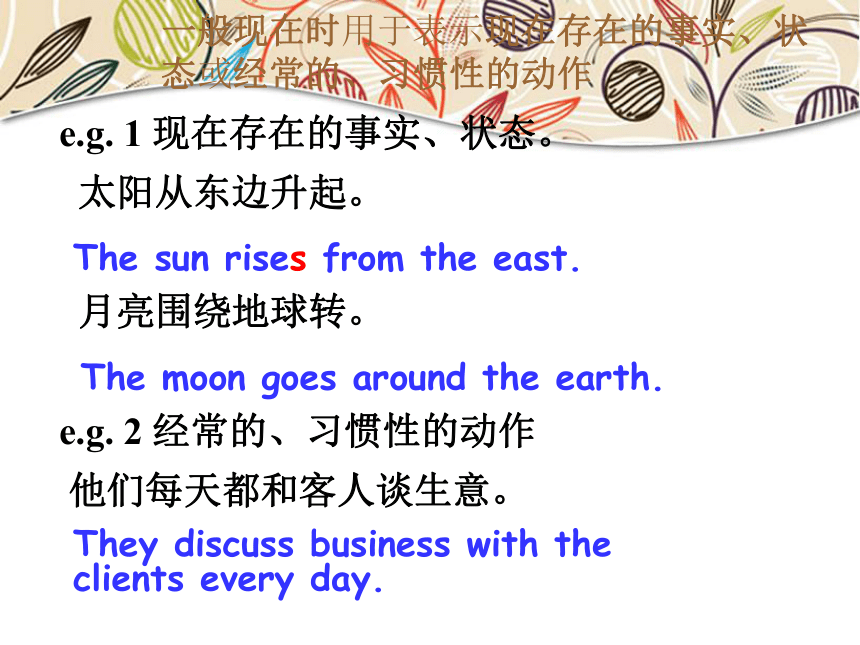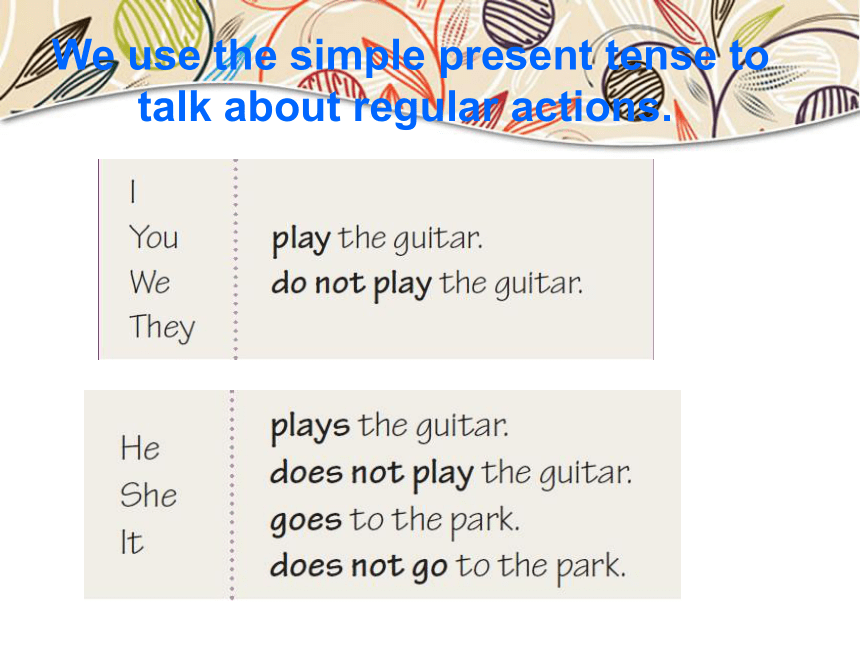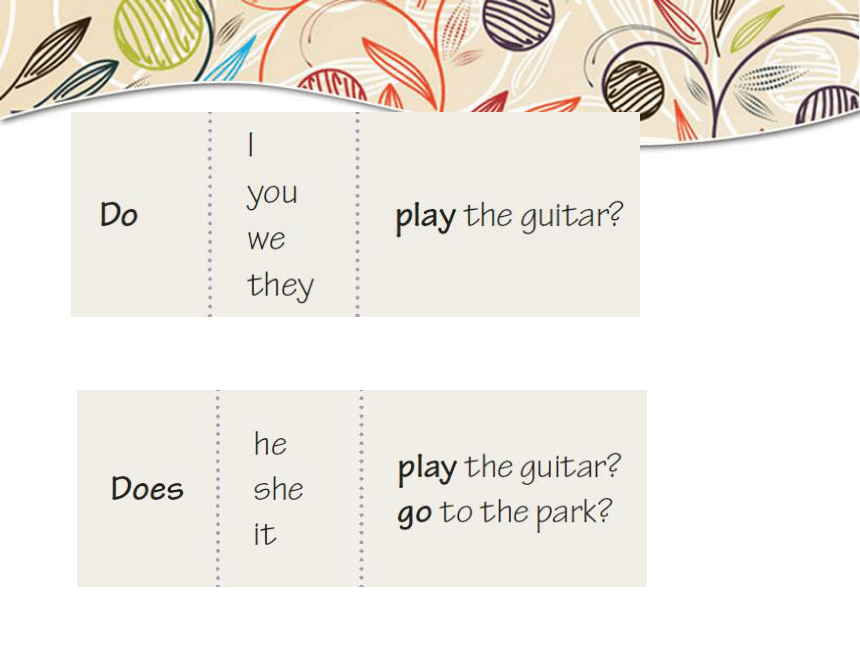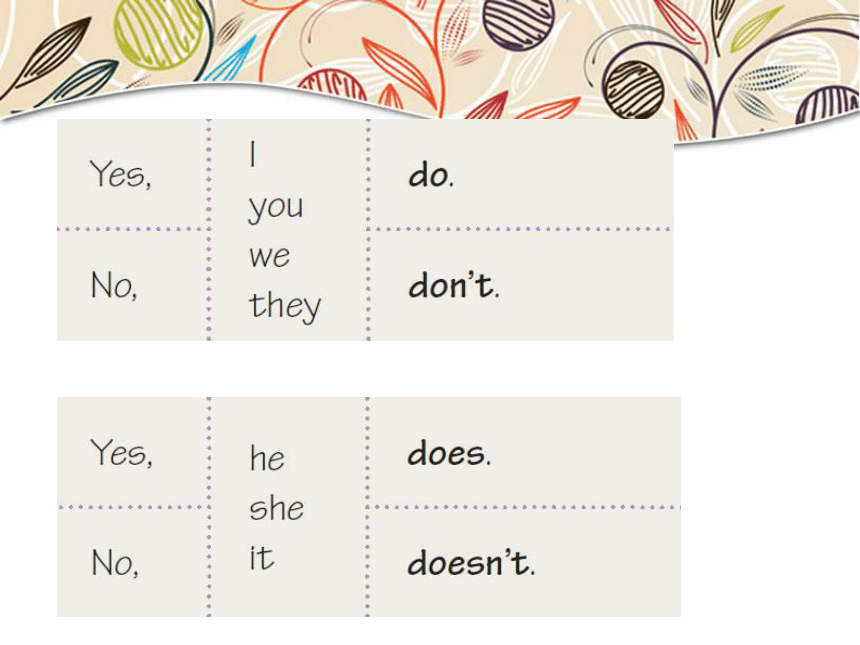Module 1 My life Unit 2 daily life Grammar (一般现在时)教学课件
文档属性
| 名称 | Module 1 My life Unit 2 daily life Grammar (一般现在时)教学课件 |  | |
| 格式 | zip | ||
| 文件大小 | 796.2KB | ||
| 资源类型 | 教案 | ||
| 版本资源 | 牛津深圳版 | ||
| 科目 | 英语 | ||
| 更新时间 | 2016-05-21 04:39:42 | ||
图片预览









文档简介
课件23张PPT。Unit 2
GrammarTranslation1. Sam经常参加学校的吉他训练。
Sam often _____ ______ ______ the school
guitar practice.
2. -你平时是走路上学的吗?-是的。
-_____ you usually _____ to school on foot?
-Yes, I ______.
3. -汤姆喜欢学习地理吗?
-不,他不喜欢。他喜欢生物。
-_______ Tom _______ Geography?
-No, he _______. He ________ Biology. takes part in Dogodo Does likedoesn'tlikes一般现在时用于表示现在存在的事实、状态或经常的、习惯性的动作Read the following sentences and tell the meanings.
She plays basketball on Mondays and Thursdays.
They often discuss business at dinner.The Simple Present Tense一般现在时用于表示现在存在的事实、状态或经常的、习惯性的动作e.g. 1 现在存在的事实、状态。
太阳从东边升起。
月亮围绕地球转。
e.g. 2 经常的、习惯性的动作
他们每天都和客人谈生意。The sun rises from the east.The moon goes around the earth.They discuss business with the clients every day.第三人称单数主语 + am/ is/ are (表示状态)
主语(I/We/You/They)+动词原形
主语(He/She/It)+动词(s)主语 + be (am, are, is) not
I/ We / You/ They + don’t +动词原形
She/ He/ It + doesn’t +动词原形
Be (Am, Are, Is) + 主语
Do+ I/ we/ you/ they +动词原形
Does+ she/ he/ it + 动词原形一般现在时的 否定 和 疑问I am a student in Junior One.
--- _______ you a student in
Junior One?
--- Yes, I _______. / No, I _______.Areamam not例如:We use the simple present tense to talk about regular actions.Work out the rules1. In statements, we add -s or ______ to verbs after he/she/it.
2. In questions, we use _____ before I/you/we/they and _________ before he/she/it. -es do doesA1 Use the information in the article on Page 17 to complete the conversation below.S1: (1)_______ Sam ______(go) to school by bus?
S2: No, he (2)________. He (3)______(go) to
school on foot.
S1: (4)______ Sam and his friends _____(play)
games during the morning break?
S2: Yes, they (5)______.
S1: What (6)______ Sam _____(do) after school?
S2: He (7)_______(take) part in the school band
practice. Doesgo doesn't goes Do play do does do takes 动词一般现在时第三人称单数变化规则A2 In pairs, talk about the things in the box. go to school by bus
study Chinese, Maths and English in the morning
take part in after-school activitiesAdverbs of frequency总是通常经常有时不常,很少从不 We use adverbs and adverbial phrases of frequency to talk about how often things happen.I always/ usually/ often/sometimes/
seldom/ never go to school on foot.Adverbial phrases of frequencyI go to the English Club every day.
twice a week.
On Saturdays, I go to the park.
Once a month,Work out the rule:
1. Adverbs of frequency come (before/after) the main verbs.
2. Adverbial phrases of frequency often come (in the middle/at the end) of a sentence. Sometimes they come at the beginning.My Chat RoomMandy: How often do you watch television?
Sam: (1)__________________________(every night)
Mandy: How often do you eat out?
Sam: (2)_______________________(sometimes)
I watch television every night. I sometimes eat out.Mandy: How often do you play table tennis with your father?
Sam: (3)________________________ ___________________(once a week)
Mandy: How often do you win?
Sam: (4)______________________(seldom)
I seldom win. I play table tennis with my father once a week.Mandy: How often do you visit other cities?
Sam: (5)_______________________________(four times a year)
Mandy: How often do you play computer games?
Sam: (6)_______________________(never) I never play computer games. I visit other cities four times a year.选择填空。( ) 1. My mother usually _____ up first in our family.
A. get B. gets C. getting D. got
( ) 2. _____ your friends play the guitar at school every day?
A. Is B. Are C. Do D. Does
( ) 3. Sam goes to school early in the morning. He _____ never late for school.
A. is B. isn’t C. does D. doesn’t BCAExercise 1( ) 4. Sally _____ play the guitar. She _____ the piano.
A. isn’t; plays B. is; play
C. doesn’t; plays D. don’t; play
( ) 5. — _____ do you go to the market?
— Seldom.
A. How much B. How long
C. How many D. How often CD用所给动词的适当形式填空。
Lin Tao often ______ (watch) TV for a while before going to bed.
2. — ______ your grandparents _______
(live) far away from you?
— No, they _______.
3. Classes in my school _______ (end) at
4:40 p.m. every day.
4. My mother often _______ (take) a walk
after supper.Exercise 2watchesDo livedon’tendtakes
GrammarTranslation1. Sam经常参加学校的吉他训练。
Sam often _____ ______ ______ the school
guitar practice.
2. -你平时是走路上学的吗?-是的。
-_____ you usually _____ to school on foot?
-Yes, I ______.
3. -汤姆喜欢学习地理吗?
-不,他不喜欢。他喜欢生物。
-_______ Tom _______ Geography?
-No, he _______. He ________ Biology. takes part in Dogodo Does likedoesn'tlikes一般现在时用于表示现在存在的事实、状态或经常的、习惯性的动作Read the following sentences and tell the meanings.
She plays basketball on Mondays and Thursdays.
They often discuss business at dinner.The Simple Present Tense一般现在时用于表示现在存在的事实、状态或经常的、习惯性的动作e.g. 1 现在存在的事实、状态。
太阳从东边升起。
月亮围绕地球转。
e.g. 2 经常的、习惯性的动作
他们每天都和客人谈生意。The sun rises from the east.The moon goes around the earth.They discuss business with the clients every day.第三人称单数主语 + am/ is/ are (表示状态)
主语(I/We/You/They)+动词原形
主语(He/She/It)+动词(s)主语 + be (am, are, is) not
I/ We / You/ They + don’t +动词原形
She/ He/ It + doesn’t +动词原形
Be (Am, Are, Is) + 主语
Do+ I/ we/ you/ they +动词原形
Does+ she/ he/ it + 动词原形一般现在时的 否定 和 疑问I am a student in Junior One.
--- _______ you a student in
Junior One?
--- Yes, I _______. / No, I _______.Areamam not例如:We use the simple present tense to talk about regular actions.Work out the rules1. In statements, we add -s or ______ to verbs after he/she/it.
2. In questions, we use _____ before I/you/we/they and _________ before he/she/it. -es do doesA1 Use the information in the article on Page 17 to complete the conversation below.S1: (1)_______ Sam ______(go) to school by bus?
S2: No, he (2)________. He (3)______(go) to
school on foot.
S1: (4)______ Sam and his friends _____(play)
games during the morning break?
S2: Yes, they (5)______.
S1: What (6)______ Sam _____(do) after school?
S2: He (7)_______(take) part in the school band
practice. Doesgo doesn't goes Do play do does do takes 动词一般现在时第三人称单数变化规则A2 In pairs, talk about the things in the box. go to school by bus
study Chinese, Maths and English in the morning
take part in after-school activitiesAdverbs of frequency总是通常经常有时不常,很少从不 We use adverbs and adverbial phrases of frequency to talk about how often things happen.I always/ usually/ often/sometimes/
seldom/ never go to school on foot.Adverbial phrases of frequencyI go to the English Club every day.
twice a week.
On Saturdays, I go to the park.
Once a month,Work out the rule:
1. Adverbs of frequency come (before/after) the main verbs.
2. Adverbial phrases of frequency often come (in the middle/at the end) of a sentence. Sometimes they come at the beginning.My Chat RoomMandy: How often do you watch television?
Sam: (1)__________________________(every night)
Mandy: How often do you eat out?
Sam: (2)_______________________(sometimes)
I watch television every night. I sometimes eat out.Mandy: How often do you play table tennis with your father?
Sam: (3)________________________ ___________________(once a week)
Mandy: How often do you win?
Sam: (4)______________________(seldom)
I seldom win. I play table tennis with my father once a week.Mandy: How often do you visit other cities?
Sam: (5)_______________________________(four times a year)
Mandy: How often do you play computer games?
Sam: (6)_______________________(never) I never play computer games. I visit other cities four times a year.选择填空。( ) 1. My mother usually _____ up first in our family.
A. get B. gets C. getting D. got
( ) 2. _____ your friends play the guitar at school every day?
A. Is B. Are C. Do D. Does
( ) 3. Sam goes to school early in the morning. He _____ never late for school.
A. is B. isn’t C. does D. doesn’t BCAExercise 1( ) 4. Sally _____ play the guitar. She _____ the piano.
A. isn’t; plays B. is; play
C. doesn’t; plays D. don’t; play
( ) 5. — _____ do you go to the market?
— Seldom.
A. How much B. How long
C. How many D. How often CD用所给动词的适当形式填空。
Lin Tao often ______ (watch) TV for a while before going to bed.
2. — ______ your grandparents _______
(live) far away from you?
— No, they _______.
3. Classes in my school _______ (end) at
4:40 p.m. every day.
4. My mother often _______ (take) a walk
after supper.Exercise 2watchesDo livedon’tendtakes
